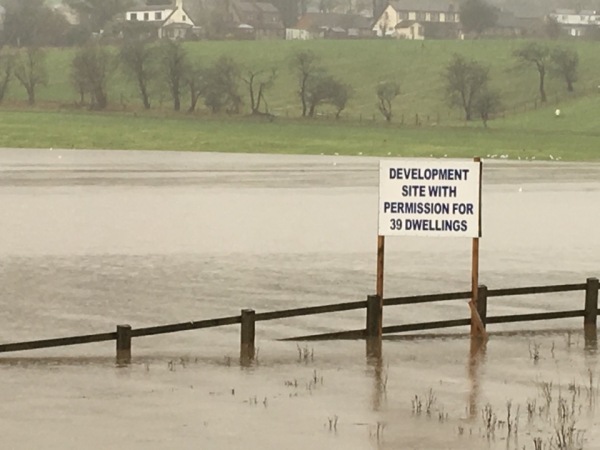I’m about to break with tradition and who knows, I might even set a trend. Who’d believe it, a blogger ranting about something they know a little about?
So here goes.
Some time ago I was involved in the Flood Defence Advisory Committee covering Cumbria and North Lancashire. It was part of the National Rivers Authority. This existed between 1989 and 1996. It was a result of one of Margaret Thatcher’s last privatisations. To quote the wiki (because I’m idle and it’s correct)
“Before 1989 the regulation of the aquatic environment had largely been carried out by the ten Regional Water Authorities (RWAs). The RWAs were responsible for the supply and distribution of drinking water, sewerage and sewage disposal, land drainage and flood risk management, fisheries, water quality management, pollution prevention, water resource management and many aspects of the management of aquatic ecology and some aspects of recreation. With the passing of the Water Act 1989, the 10 Water Authorities in England and Wales were privatised by flotation on the stock market. They took the water supply, sewerage and sewage disposal activities into the privatised companies. The remaining duties remained with the newly created National Rivers Authority.”
The Flood Defence Advisory Committee was composed of local authority reps, plus some from local industry and agriculture (me) so it meant that the community got to look at what was going on. But two things struck me at the time. The staff of the NRA had largely come from the Regional Water Authorities. They were for the most part engineers. Up until the creation of the NRA they had been ‘sat upon’ by the RWAs who as part of the state did such things as cheerfully dump poorly treated sewage because proper treatment plants ‘weren’t in budget’. Now the gloves were off, and whilst their colleagues were now no longer bureaucrats but the highly paid employees of a privatised company it was the engineers who could hold their feet to the fire and make damned sure they actually spent the money and fulfilled their legal obligations.
This they did. At times there was almost an air of schadenfreude in the air as they recounted tales of ex-bureaucrats who had spent a career avoiding having to install the proper plant, now facing major fines if they didn’t. Obviously there was a price to pay, and by and large it was paid by the user. But then, the question has to be asked, “If you don’t want your faeces to join you on the beach for a summer holiday, who is responsible for paying for your faeces to be properly disposed of?
The other thing that struck me was that these guys knew their stuff. They had good relations with plant hire firms, they knew the waterways and they made sure that the regular work was done. They were so good that one chap I knew was headhunted personally by the government of Bangladesh because they needed the best.
But time moves on and we were ‘blessed’ with the Environment Agency. It was created under an act passed by John Major, but the problem came when the incoming Labour Government appointed people to lead it.
To an extent the Environment Agency has been a victim of government. When you look at the people chosen to lead it, there was Labour peeress, Baroness Young of Old Scone, chair of English Nature; vice chairman of the BBC; board member of AWG plc; Chief Executive of the Royal Society for the Protection of Birds and of a number of local health authorities. She was not merely reluctant to dredge rivers, she is famously said to have remarked that she wanted to see ‘a limpet mine attached to every pumping station’. She was followed by Chris Smith, environmental spokesman under John Smith in opposition, but only Culture Secretary under Tony Blair in government.
You can judge the attitude of governments by the people they appoint. Frankly it is obvious that previous governments haven’t taken flooding, land drainage and agriculture seriously.
It isn’t just government. For example in Cumbria there has been an effort to ‘turn the pumps off’ in areas like the Lyth Valley, the RSPB has ranted about this over on http://www.rspb.org.uk/whatwedo/campaigningfornature/casework/details.aspx?id=tcm:9-295709
But let’s put it bluntly. Rather than being three decades, the Lyth Valley was first drained just after the Napoleonic Wars. Switching pumps off, thus allowing the levels to rise means that people whose houses are ‘still protected’ will have septic tanks that are below the water table for much of the year and will spent their time driving along roads which regularly flood. Not only that but the main A590 was cut in the flooding this year meaning that 100,000 people were cut off from such things as regular deliveries of milk and bread, you know, life’s little luxuries. With the Lyth Valley pumps switched off that is likely to become more common.
Indeed the RSPB might well have more say on the policies of the Environment Agency than local communities, given that the EA claimed they couldn’t afford the £4.5 million that it would have cost to dredge the rivers down on the Somerset Levels, but somehow found £31 million for a bird sanctuary.
So what to do? Well get the engineers back in charge for a start. Let’s get rivers cleaned out properly. As one chap said, ‘If the bath is overflowing and you cannot turn the taps off, you don’t build up the sides of the bath, you take the bluidy plug out.”
Then stop local authorities building on the flood plain.

I checked this picture out; because it was so good I wondered if it had been photo-shopped.
But no, it’s right. And one of the papers followed up and checked with the local Planning Authority. As required to do, the Planning Authority consulted the EA on three applications that made up that development. The EA made no comment on two of the applications and in the third case it said it “had no objection in principle.”
Strikes me, somebody needs to find their P45 waiting for them on their desk when they get back to work after Christmas.
Tagged: Baroness Young, flooding, John Major, Margaret Thatcher, NRA, Tony Blair


You stuck to the facts Jim…
every so often I do that, it causes confusion 🙂
Confuse and Conquer Jim LOL 😀
I’ve never been good enough at maths to rely upon ‘divide’ and conquer
😀 😀 😀
Thanks for writing this. As we live up the hill from this field, no doubt we will be consulted on this later this year, when the combined application for the two sites is submitted. I hope that the EA give it some serious thought this time round : )
Hi Tim, I hope you and yours haven’t been too bothered by the flooding. Like you I hope that the EA gets its act together and does the sensible thing